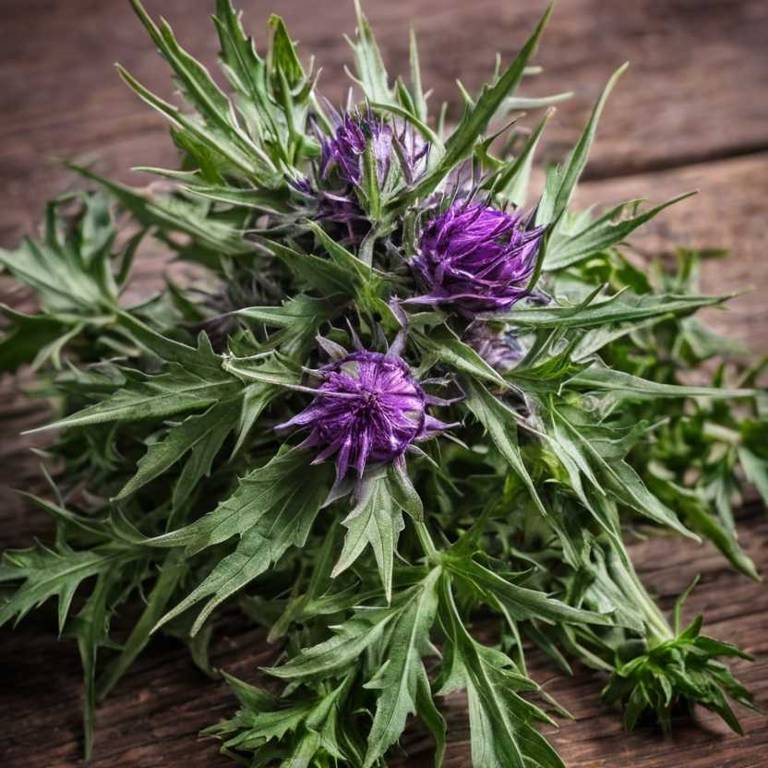By Leen Randell
Updated: Jul 05, 2024
What Are The Medicinal Properties Of Silybum Marianum (Milk Thistle)?

Silybum marianum, also known as milk thistle, has health benefits such as antioxidant and anti-inflammatory properties, which can help protect the liver from damage.
Its medicinal constituents include silymarin, a complex mixture of flavonoids and polyphenols that have been shown to be effective in treating liver conditions such as cirrhosis and hepatitis. The herb is often prepared as a dietary supplement in capsule or tablet form. Potential side effects of using milk thistle include gastrointestinal upset and allergic reactions.
Those with liver disease or on certain medications should consult a healthcare professional before using milk thistle.
This article explains the health benefits, active constituents, medicinal preparations, possible side effects, and precautions related to Silybum marianum.
What are the health benefits of Silybum marianum?
Silybum marianum, also known as milk thistle, has health benefits such as protecting the liver from damage and promoting its regeneration.
The herb's active compounds, known as silymarin, have antioxidant and anti-inflammatory properties, which can help to reduce liver inflammation and scarring.
Studies have shown that milk thistle can also improve liver function in people with liver disease, such as hepatitis and cirrhosis.
Here's a detailed article about the 10 health benefits of Silybum marianum.
What are the active constituents of Silybum marianum?
Silybum marianum, also known as milk thistle, has active constituents such as silymarin and silibinin, which are flavonoid and polyphenol compounds.
These constituents are responsible for the plant's hepatoprotective properties, reducing liver inflammation and damage caused by toxins.
Additionally, silibinin has been shown to exhibit antioxidant and anti-cancer properties, making milk thistle a valuable natural remedy for promoting liver health and potentially alleviating certain health conditions.
Here's a detailed article about the 10 active constituents of Silybum marianum.
What are the medicinal preparations of Silybum marianum?
Silybum marianum, also known as milk thistle, has medicinal preparations such as silymarin and silibinin, which are standardized extracts of the plant's seeds.
These preparations are used to treat liver diseases, particularly those caused by toxins or drug-induced damage. Silymarin and silibinin have antioxidant and anti-inflammatory properties, which help to protect liver cells and promote regeneration.
They are often used to treat conditions such as cirrhosis, fatty liver disease, and liver cancer.
Here's a detailed article about the 10 medicinal preparations of Silybum marianum.
What are the possible side effect of using Silybum marianum improperly?
Improper use of Silybum marianum, also known as milk thistle, increases the chances of experiencing side effects such as stomach upset, diarrhea, and nausea.
Additionally, high doses can cause allergic reactions, such as hives and itching, as well as liver damage in rare cases.
Women who are pregnant or breastfeeding should exercise caution when using milk thistle, as its effects on the fetus or baby are not well understood.
Here's a detailed article about the 10 most common side effects of Silybum marianum.
What precautions to take when using Silybum marianum medicinally?
Before using Silybum marianum, also known as milk thistle, for medicinal purposes, you must take precautions such as consulting with a healthcare professional, especially if you have pre-existing liver or kidney conditions, as the herb can exacerbate these conditions.
Additionally, pregnant and breastfeeding women should use it with caution, and individuals with allergies should avoid it altogether.
It's also essential to follow the recommended dosage to avoid interactions with other medications.
Here's a detailed article about 10 precautions to take when using Silybum marianum.